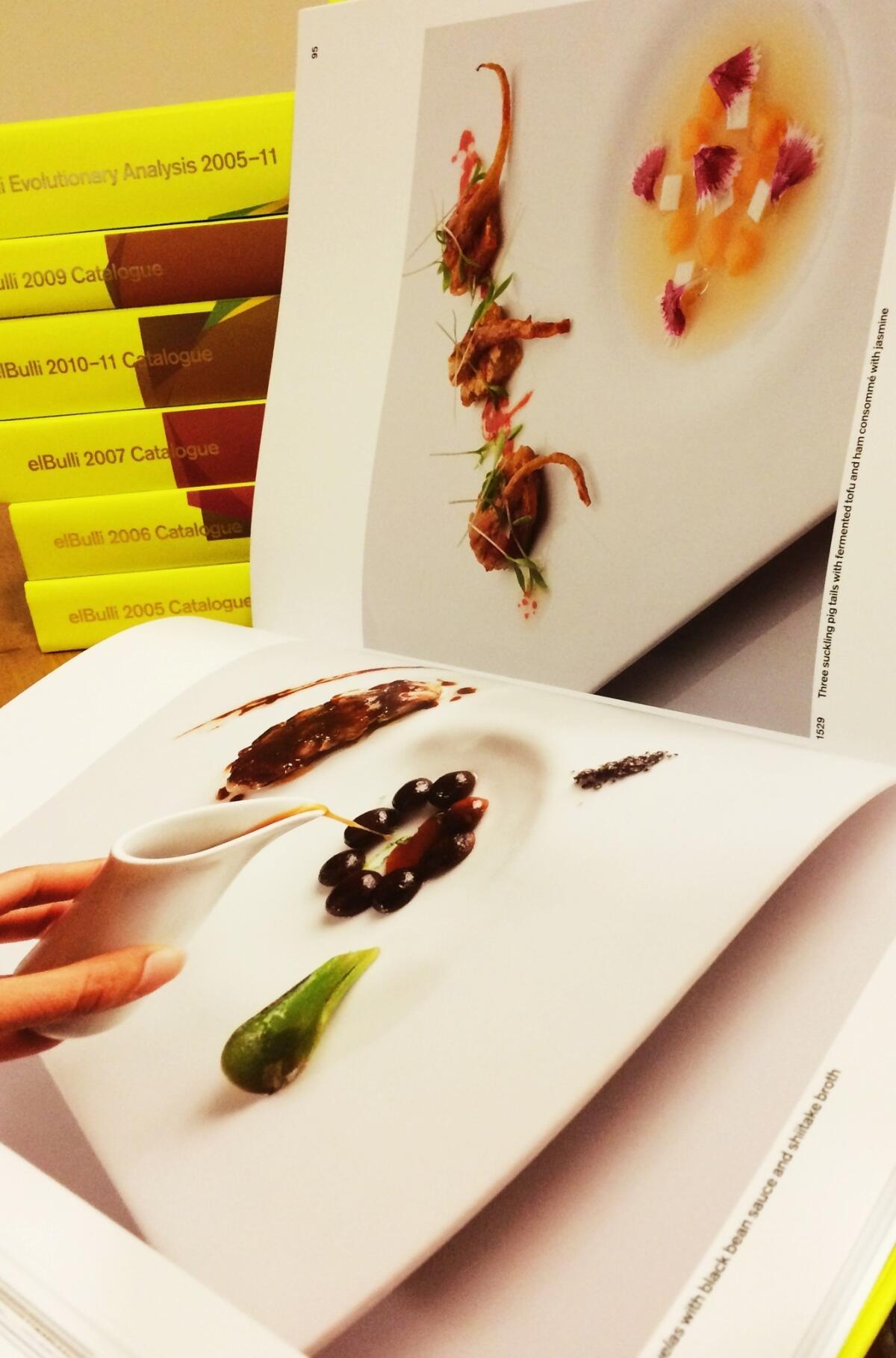El Bulli treasure trove clears up a mystery — why it all ended

The new “El Bulli” box set is overwhelming — seven volumes, almost 3,000 pages, nearly 40 pounds and with a retail price of $625. There are, according to the publisher (and who is going to count to argue?), 1,400 images that capture what seems like almost every dish served at the landmark Spanish restaurant between 2005 and 2011, when it closed.
And it also contains a hidden surprise: an explanation from chef Ferran Adria and his team of their shocking decision to shut the place down.
As Adria himself explains in an introductory video to the book, “I think that El Bulli 2005-2011 is the end of the dream that was El Bulli ... and this book explains what happened.”
One of the most famous — and controversial — restaurants in the world, El Bulli pioneered what is now called modernist cuisine. That’s the transformation of ingredients by techniques not bound by traditional cooking, into forms and flavors that might not traditionally be thought of as dishes.
If you have even a passing interest in this kind of hyper-modern (and even post-modern) cooking, you probably already have this collection on your wish list. And you probably already know what to expect, since you have on your bookshelf the earlier editions (capturing 1983-93, 1994-97, 1998-2002 and 2003-04 … you’d better hope it’s a sturdy shelf).
The photography of the food is exquisite and the explanations fascinating. Yes, there are recipes. No, you will probably not be trying them at home. The recipe for a dessert called simply “Moss” from the 2008 catalog runs three pages and includes 16 sub-recipes. (Still, some of those sub-recipes are certainly approachable, and could even be incorporated into a relatively ambitious home cook’s repertoire.)
It’s all fascinating stuff, but maybe most interesting is the explanation, buried in the volume titled “Evolutionary Analysis, 2005-2011,” of why Adria and his team decided to close the restaurant at what seemed like the peak of its popularity. It was the culinary equivalent of basketball star Michael Jordan retiring at the top of his game.
There wasn’t one single reason, according to the book. Rather, it was a confluence of several factors — culinary, personal and, because it’s El Bulli, philosophical. Most had been reported individually before, but putting it all together this way makes for fascinating reading.
Partly, it was out of boredom. It seems that from 2005 on, Adria and his team had become more and more focused on the organizational part of the restaurant, in addition to the invention of dishes. In other words, perfecting the process by which the dishes were reproduced, rather than the inspiration that created them.
“The time came when there were very few things left to improve on the organizational front, which brought with it a certain monotony.”
At the same time, in addition to much praise (books were written about the place, there was a joint exhibit at the Pompidou Center in Paris, and the establishment of a Ferran Adria chair in Gastronomic Culture and Food Sciences by the Camilo Jose Cela University in Madrid), there were problems.
Modernist cooking was suffering through a backlash, particularly in Europe, that included several books and articles alleging that the techniques and ingredients were harmful to diners. And El Bulli seemed to be the centerpiece for all of them.
“All of this made us realize that there was a certain tiredness in the many years of El Bulli’s hegemony.”
There was also a court case filed by the heirs of one of the restaurant’s former partners claiming that Adria and his team had cheated them out of part of their inheritance. (The case was dismissed.)
And, oddly enough, the book cites the case of a Swiss gourmet who talked a wealthy friend into backing him as he attempted to dine at every Michelin three-star restaurant in a period of three months. Apparently, he disappeared from El Bulli after dinner (but before paying his check).
“We were greatly concerned, at first thinking that some misfortune had befallen him.” They needn’t have worried. He was later spotted by Interpol withdrawing money from several Swiss banks, “he stated that the media attention he had received had affected him psychologically and that there had been a moment when he did not remember who or where he was.”
Perhaps more to the point, there was the departure in 2008 of Albert Adria, Ferran’s brother, the pastry chef and an indispensable member of the team from the beginning of the restaurant, which required a reorganization of the whole team.
It all added up to a period of reflection for Adria and his then-business partner Juli Soler (who eventually left the organization in 2012 for health reasons). “Not surprisingly, Ferran and Juli saw things differently and had differences of opinion, but a consensus was reached between them in the end, and it was decided that they would take two years off in which to learn, rest and find renewal.”
The closure of the restaurant was supposed to be for only two years, reopening in 2014. That has yet to happen, but Adria is very busy, establishing multiple ventures, including the El Bulli Foundation and an online encyclopedia of gastronomy called Bullipedia, which is still in the works.
ALSO:
Hipsters love coffee, yes they do!
Pot on your pizza? Yes, in Vancouver
Angel City releases a Mexican cola-flavored beer
More to Read
Eat your way across L.A.
Get our weekly Tasting Notes newsletter for reviews, news and more.
You may occasionally receive promotional content from the Los Angeles Times.








